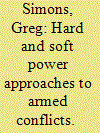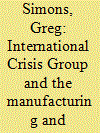| Srl | Item |
| 1 |
ID:
167774


|
|
|
|
|
| Summary/Abstract |
The role of digital communication has been given a lot of credit and influence in its presumed power to bring about change in society, on a local or national or global level. When this presumed power for change or disruption is applied to the existing world order, there is a more nuanced outcome. In the current global order, the United States remains the unipolar hegemonic power. However, it is becoming visibly weakened, much of the harm coming from the results of its own foreign policy actions that are more guided by values and norms, rather than interest. Digital communication plays a role in both defending the current world order and challenging it. It is done in a way that renders the traditional restraints and constraints of geopolitics impotent by making space and time irrelevant, and by opening up the potential for creating global networks and relationships.
|
|
|
|
|
|
|
|
|
|
|
|
|
|
|
|
| 2 |
ID:
179206


|
|
|
|
|
| Summary/Abstract |
Armed conflicts are generally associated with the use of hard power for coercing and forcing an opponent to do something against its will in a situation where war is an extension of politics. However, there are many scholarly observations about the important role of soft power in armed conflicts, the interaction between hard and soft power, and the effects on one another within the framework of an armed conflict. This paper explores two specific armed conflicts, the 2003 U.S.-led military intervention in Iraq and the 2015 Russian intervention in Syria. Various aspects of hard and soft power approaches are discussed, and the outcome of military operations for the national soft power potential is analyzed. The results of the study show that whereas the Iraq War came as a disaster for the U.S., the military operation in Syria—despite dire predictions—created strengths and opportunities for Russia in international relations.
|
|
|
|
|
|
|
|
|
|
|
|
|
|
|
|
| 3 |
ID:
174608


|
|
|
|
|
| Summary/Abstract |
Nowadays hybrid warfare is considered a significant security challenge; within this wider threat category are cyber incidents that are considered one of the main perceived threats in modern society for every country. The number of incidents in cyber space is constantly growing, but methods of its realisation are evolving. One of the most dangerous consequences of cyber-attacks is a planned or spontaneous chain effect that is accompanied by destructive results. Ukraine is used as a contemporary example of this type of attack and subversion. This is later put into context with trends and events on a wider international level that imply legal regulation conflicts with political and operational expediency in managing the problem of cyber-attacks.
|
|
|
|
|
|
|
|
|
|
|
|
|
|
|
|
| 4 |
ID:
133256


|
|
|
|
|
| Publication |
2014.
|
| Summary/Abstract |
The International Crisis Group (icg) has the motto 'working to prevent conflict worldwide'. As an organisation the icg occupies a very specific niche role, which is related to crises of a political nature, specifically armed conflict. While the icg employs a negative understanding of crisis, the academic definition of what a crisis may constitute is broader, as it can actually represent an opportunity for some actors. This article, written from a communication studies perspective, seeks to address how crises are manufactured in icg texts. It argues that the way in which crisis events are viewed and reacted to depends on the level of information and 'knowledge' that is produced and circulating about them. The article tackles the issue of the strategic level of the icg in terms of its means and mechanisms of attempting to project influence. It explores the different ploys and strategies used to influence policy makers, especially its communication strategy, the different values and ethics that are highlighted, and the 'causes' that are promoted.
|
|
|
|
|
|
|
|
|
|
|
|
|
|
|
|
| 5 |
ID:
112774


|
|
|
|
|
| Publication |
2012.
|
| Summary/Abstract |
Security Sector Reform (SSR) holds different meanings and hence varying implications for recipients and donors. Therefore, as an initial point of departure it is necessary to offer a more precise understanding of what can the European Union (EU) offer as a donor to recipient nations in need of SSR? The empirical case of Georgia presents an interesting and challenging case for SSR. There have been a number of domestic and international conflicts in the post-Soviet era, which has left a volatile legacy. There needs to be a cautious and long-term approach that balances what Georgia needs and wants with what the EU can offer. Rather than a narrow approach to the SSR programme, a broader and more encompassing assistance needs to be undertaken in order to affect a more stable and sustainable change. This process shall require talking and offering, but also listening to what Georgian officials request and desire.
|
|
|
|
|
|
|
|
|
|
|
|
|
|
|
|